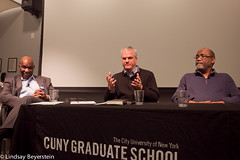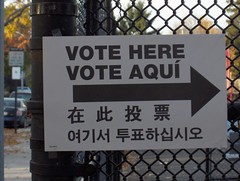
Last night, the Sidney Hillman Foundation kicked off Black History Month with an exclusive preview of the documentary Slavery By Another Name, which premieres Feb 13 on PBS. The film’s Hillman Award-winning director, Sam Pollard, and the source book’s Pulitzer Prize-winning author, Douglas Blackmon, joined SEIU executive vice president Gerry Hudson for a spirited panel discussion and audience Q&A at the CUNY Graduate School of Journalism.
Slavery By Another Name debunks the cherished assumption that slavery ended with the Emancipation Proclamation. In fact, as Blackmon and Pollack show, the enslavement of black Southerners persisted under the guise of convict labor from the end of Reconstruction to the beginning of World War II. This new kind of slavery wasn’t a necessarily a life sentence, and it didn’t pass from generation to generation, but it was every bit as brutal and arbitrary as the old system.
The polite term for the new slavery was “convict leasing.” Southern states criminalized the slightest infractions by black people, real or imagined. It was a crime to be unemployed, or to be employed and look for a better job without permission. Unauthorized black job-seekers could be sent back to their employers to work off their “debt” as convict laborers. Walking along the railroad tracks or speaking loudly in the presence of white women could also condemn a black person to a term of hard labor.
Strictly speaking, debt peonage was against the law. So, a farmer couldn’t force a black person to work to pay off a private debt; if he did, the U.S. Department of Justice might step in. However, the state could force black people to work to pay off fines levied against them; and the state could sell that labor to factories and farms. The Justice Department couldn’t do anything about that. A loophole in the 13th Amendment abolished slavery except as a sentence for a crime.
Director/producer Sam Pollock added that the convict lease system was comforting to white Southerner because it allowed them feel like the South hadn’t lost the Civil War after all. Defeat did nothing to extinguish the white ruling class’s sense of entitlement to indentured black labor.
Employers paid the state to “lease” the prisoners. As under slavery, the hardiest-looking men fetched the highest prices. About 95% of the people in the convict labor system were black men between the ages of 14 and 30, because they were the most desirable laborers. Some women were also forced to work as laundresses and cooks. Blackmon’s resesarch shows how arrest rates rose to meet the demand for labor.
When black and white coal miners joined forces under the banner of the United Mineworkers in 1908, the mine owners used convict labor to help break the strike.
“Money explains most things,” said Blackmon, a longtime Wall Street Journal reporter. He later observed that a “potentially diabolical” conflict of interest arises when the people responsible for making arrests stand to profit by arresting more people.
Blackmon dates the technical end of slavery to 1943, when the first prosecution of de facto slave owners took place. FDR had decided that the plight of blacks in the South was too good a propaganda tool to hand to the Japanese and empowered his Attorney General to go after the neo-slavers. Whites were occaisionally prosecuted for enslaving blacks into the late sixties.
Today, the private prison industry stands to benefit from harsh laws and strict enforcement and lobbies accordingly. At least today the state doesn’t have the same direct profit motive to lock up more people as it did under the convict lease system. However, the criminal law was the lynchpin of the convict lease system. The state decided what was a crime and the elites who profited from prison labor had a vested interest in criminalizing black people to ensure a steady supply of convict labor. The energetic private prison lobby fosters a similar dynamic today, although today’s private prisons aren’t as powerful as the mining and farming barons of the old South during the era of neo-slavery. The explicit legal double standard for whites and blacks is gone, but the war on drugs has the effect of putting disproportionate numbers of black Americans behind bars.
As Douglas Blackmon pointed out, the convict lease system was how our society got used to “locking up large numbers of similar-looking people.”
[Photo: Gerry Hudson, Douglas Blackmon, and Sam Pollard. By Lindsay Beyerstein. More photos of last night’s screening, here.]










